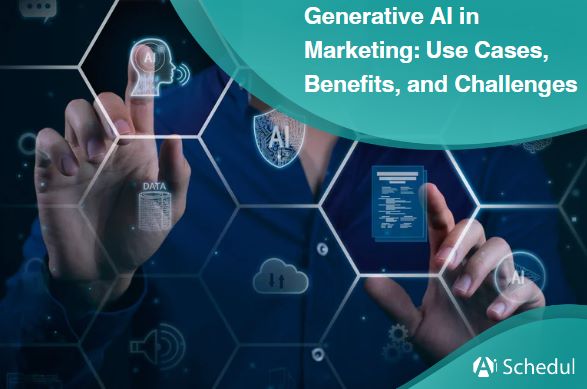
In the rapidly evolving landscape of digital marketing, staying ahead means harnessing the power of cutting-edge technologies. Among these, generative AI in marketing emerges as a transformative force, revolutionizing marketing strategies and reshaping how brands engage with their audiences.
Generative AI, adopted by 37% of professionals working in marketing and advertising, is a subset of artificial intelligence that exhibits remarkable capabilities in creating content that mimics human-like creativity and intelligence. Its applications extend across various domains, profoundly influencing the digital marketing sphere.
In this article, we delve into the multifaceted applications of generative AI in marketing, examining diverse use cases, unraveling the plethora of benefits, and addressing the inherent challenges.
Join us on this insightful journey as we navigate through the intricate landscape of AI-driven marketing and uncover the transformative potential it holds for businesses worldwide.
Table of Contents
Use Cases of Generative AI in Marketing
Let’s take a look at some use cases of generative AI:
Text Generation
Thanks to generative AI platforms, brands and marketers can create compelling and personalized AI generated content that connects with existing and prospective customers on a personal level.
From crafting engaging social media posts and personalized email marketing campaigns to generating product descriptions and blog articles, generative AI streamlines content creation processes, ensuring relevance and resonance with target audiences.
Image Generation
Using generative AI for image generation facilitates the creation of captivating visuals tailored for specific marketing campaigns. It enables the production of unique graphics, customized designs, and even realistic product mock-ups, enhancing visual storytelling and brand aesthetics across various digital platforms.
Video Generation
Generative AI’s capabilities extend to video creation, simplifying the process of producing dynamic and attention-grabbing video content. It assists in generating personalized video ads, product demos, and explainer videos, fostering deeper engagement and conveying brand messages effectively.
Music Generation
In marketing, generative AI contributes to the creation of custom soundtracks, jingles, and background music, elevating brand experiences through unique auditory elements in advertisements, podcasts, and multimedia content.
Benefits
Generative AI introduces a multitude of advantages that revolutionize marketing strategies, empowering businesses to reach new heights of success.
Enhanced Efficiency
Generative AI streamlines content creation processes, enabling marketers to produce high-quality and personalized content at scale. This efficiency translates to time savings, allowing teams to focus on strategy, analysis, and innovative campaign ideation.
Personalization at Scale
Through AI-powered insights and content generation, marketers can create personalized campaigns tailored to individual preferences and behaviors. This personalized approach fosters stronger connections with consumers, driving engagement and loyalty.
Creative Innovation
Generative AI fuels creative innovation by assisting marketers in generating fresh and diverse content ideas. It encourages experimentation and facilitates the creation of unique, attention-grabbing campaigns that stand out in a competitive market.
Improved User Experience
By delivering tailored content and experiences, generative AI contributes to a superior user experience. Whether through personalized recommendations or customized interactions, it enhances customer satisfaction and retention.
Data-Driven Decision Making
Generative AI analyzes vast datasets to extract valuable insights, guiding data-driven marketing decisions. It enables marketers to understand consumer sentiments, trends, and behaviors, fostering more informed strategies and campaigns.
Competitive Edge
Businesses leveraging generative AI gain a competitive edge by staying at the forefront of technological advancements. This innovation allows them to adapt quickly, meet evolving consumer demands, and outpace competitors.
Challenges of Generative AI in Marketing
Despite its transformative potential, the integration of generative AI in marketing also presents several challenges that businesses need to navigate:
- Quality control: Maintaining the quality and authenticity of generated content poses a significant challenge. While AI can produce vast amounts of content, ensuring consistency, accuracy, and alignment with brand values requires meticulous oversight and refinement.
- Ethical considerations: Ethical dilemmas arise concerning the use of AI-generated content, especially in ensuring transparency and disclosure to consumers. Marketers must navigate concerns related to plagiarism, intellectual property rights, and the ethical implications of AI-generated content.
- Training and expertise: Leveraging generative AI effectively demands specialized skills and expertise. Training AI models, interpreting results, and optimizing algorithms requires a proficient understanding of AI technology, which may pose a barrier for some marketing teams.
- Data privacy and security: The use of AI in marketing involves handling large volumes of consumer data. Ensuring data privacy, complying with regulations such as GDPR, and safeguarding sensitive information against security breaches are crucial concerns.
- Over-reliance on AI: Over-reliance on generative AI without human oversight can lead to a lack of human creativity and intuition in marketing strategies. Balancing AI’s capabilities with human judgment remains a challenge to maintaining a harmonious blend of technology and creativity.
- Adaptation to rapid changes: The rapid evolution of AI technology requires marketers to adapt swiftly to new advancements and updates. Staying abreast of AI developments and integrating them effectively into marketing strategies necessitates agility and continuous learning.
Navigating these challenges effectively is pivotal for businesses aiming to harness the potential of generative AI in marketing while ensuring ethical, efficient, and impactful use of this technology.
Conclusion
The integration of generative artificial intelligence has undeniably reshaped the landscape of marketing, presenting a myriad of opportunities and challenges for businesses venturing into this realm of innovation.
The benefits are evident: enhanced efficiency, personalized experiences, creative innovation, and data-driven insights empower marketers to forge deeper connections with their audiences, gaining a competitive edge in a dynamic marketplace.
However, using generative AI in marketing is not without its challenges. Quality control, ethical considerations, skill requirements, data privacy, and the balance between AI and human creativity pose hurdles that demand careful navigation and strategic solutions.
Leveraging generative AI as a catalyst for transformative growth while keeping vigilance, adaptability, and a commitment to ethical practices top of mind results in a future where creativity and technology converge to elevate marketing endeavors.
FAQs
Let’s take a look at some frequently asked questions regarding our subject:
Q1: How Does Generative AI in Marketing Impact Content Quality and Authenticity?
Generative AI Poses a Challenge in Maintaining Content Quality and Authenticity. Businesses Should Implement Regular Review Processes and Leverage Human Expertise to Ensure Consistency, Accuracy, and Alignment with Brand Values.
Q2: What Ethical Considerations Are Associated with the Use of Generative AI in Marketing?
Ethical Dilemmas Include Transparency, Disclosure, and Intellectual Property Rights. Marketers Need to Address Concerns Related to Plagiarism, Be Transparent About the Use of AI-generated content, and Ensure Compliance with Data Privacy Regulations Such as GDPR.

